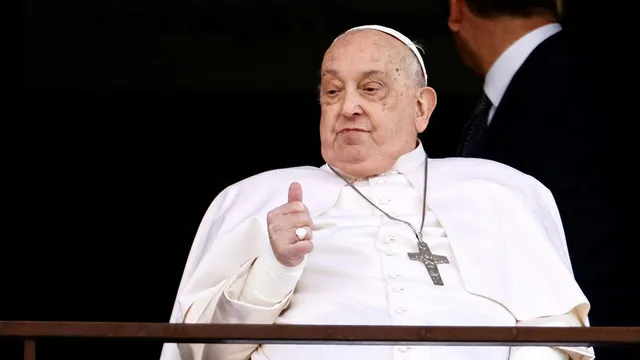
Pope Francis condemns ongoing Israeli attacks on Gaza
2025-03-23 07:28- Pope Francis delivered a message criticizing the Israeli bombing in Gaza, expressing sadness over the casualties.
- He called for an immediate halt to hostilities and urged for dialogue and humanitarian action.
- His recovery from hospitalization signals ongoing challenges and greater focus on the humanitarian crisis in Gaza.
Express your sentiment!
Insights
On March 23, 2025, Pope Francis made his first public appearance after being discharged from Rome's Gemelli Hospital, where he had been treated for a severe case of pneumonia. In a written statement, he expressed his deep sorrow over the revival of severe Israeli bombing in the Gaza Strip, which has resulted in numerous casualties. He urged for an immediate stop to the violence and called for open dialogue amidst a situation that has worsened the humanitarian crisis in the region. The Pope has requested the international community to intervene and ensure that hostages are released and a long-standing ceasefire is established. Pope Francis, who is 88 years old and seated in a wheelchair, appeared in front of the public window of the hospital with a smile and thumbs up, showing signs of improved health despite a weakened voice due to his illness. He thanked the faithful for their continued prayers and support during his hospitalization, which lasted 38 days and was marked by significant medical challenges. His life had been at risk twice during acute respiratory crises, leading to concerns about his well-being and future. While the Pope has been successfully treated for pneumonia, he is still on medication to address a fungal infection in his lungs and requires ongoing respiratory therapy. The Vatican's medical team has indicated that he might need supplemental oxygen and 24/7 care as he continues his recovery. Doctors hope his condition will improve to the point where he can gradually reduce his dependence on medical support. This public message comes at a critical point as Israel faces international scrutiny over its military actions in Palestine. The Pope's statement aligns with broader global calls for lasting peace and humanitarian efforts in the conflict-ridden region. His appeal for dialogue underscores a desire to find a resolution to the ongoing violence, which has taken a heavy toll on the civilian population in Gaza, further complicating an already dire humanitarian crisis. The urgency of the Pope's call highlights the need for compassionate action and long-term solutions to the suffering in the region.
Contexts
Pope Francis has emerged as a significant figure in international diplomacy, utilizing his position as the head of the Roman Catholic Church to advocate for peace and resolution in various global conflicts. His papacy has been marked by a proactive approach to addressing issues ranging from regional wars to humanitarian crises, all while emphasizing the importance of dialogue and understanding among different cultures and religions. This involvement is rooted in the papal mission to promote social justice and human dignity, which extends to all individuals, regardless of their faith or background. His efforts are often seen as an extension of the Church's long-standing tradition of engaging with political and social issues to foster peace and reconciliation in conflict-ridden areas. One notable instance of Pope Francis' intervention in international conflicts is his stance on the ongoing crisis in Syria. The Pope has been vocal in calling for a diplomatic solution to the violence that has ravaged the country since 2011. In 2013, he famously led a global day of fasting and prayer for peace in Syria, appealing not only to political leaders but also to ordinary citizens to foster a culture of peace. His continuous advocacy for a ceasefire and humanitarian aid conveys the Church's commitment to alleviating suffering and maintaining a focus on human life amidst the chaos of war. Similarly, Pope Francis has played an essential role in mediating tensions in the Americas, particularly in the context of the Colombian peace process. His endorsement of the peace agreement between the Colombian government and the Revolutionary Armed Forces of Colombia (FARC) was instrumental in highlighting the Church's support for reconciliation and healing in a country marked by decades of violence. The Pope's visit to Colombia in 2017 emphasized the importance of forgiveness and rebuilding communities, illustrating how the papacy can contribute positively to national healing through its moral authority and spiritual leadership. Additionally, the Pope has addressed challenges in the Middle East, advocating for dialogue and coexistence among Christians, Muslims, and Jews in the region. His historic visit to the Holy Land in 2014 reinforced his desire for peace and justice, and he has consistently called for an end to violence that disproportionately affects vulnerable populations. By promoting interfaith dialogue, Pope Francis demonstrates how religious leaders can transcend boundaries to address humanitarian concerns and pursue collaborative efforts to mitigate conflict. Through his actions and messages, Pope Francis highlights the invaluable role of faith in navigating complex international relations and fostering a culture of peace.